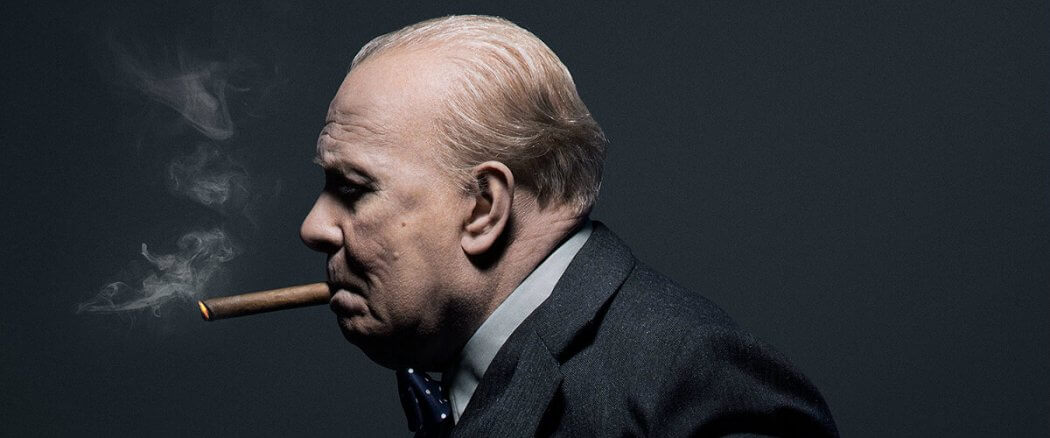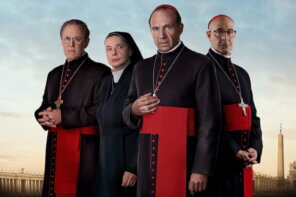In America none of us ever feared that our country would be invaded and we would be subjugated to the will of a foreign country. Even in WWII we were confident that our foreign opponents could and would be overcome, and even if they were not totally defeated, they would not invade the American continent. Imagine what the populace of the United Kingdom must have gone through in the spring of 1940 when the war they declared against Germany in August of 1939 (in conjunction with France) went from the “phony” war (with no military action) to Hitler quickly occupying most of Poland, Denmark, and Norway. Then in May 1940 Hitler’s Blitzkrieg swept through most of Western Europe and within a month Belgium, Holland and, finally, France surrendered to the “unstoppable” Nazi war machine (as Churchill said in a letter to President Roosevelt, the countries were overrun “like matchwood”).
The UK leadership was in shock that the forces of their allies were so quickly overwhelmed (the true situation was largely withheld from the general populace). Even worse, hundreds of thousands of their own troops were driven to the edge of the French coast (at Dunkirk and Calais). And now the German war machine was staring across the 21 miles of the English Channel at Great Britain, who was almost alone in its resistance to Hitler’s Wehrmacht. Can you imagine the despair we in America would experience if this were to happen in this day?
Captain of a Sinking Ship
Darkest Hour is a “based on fact” film of that one month (May 1940) in this truly incredible story of Great Britain and of their exceptional leader (with feet of clay), Winston Churchill. He was, against much resistance, thrust to the forefront to lead his nation in that terrible and “dark” time. When Neville Chamberlain, Prime Minister in the dealings with Hitler’s Germany, was labeled as the “Great Appeaser,” he lost the support of his Conservative Party leaders, who expected Viscount Halifax to accept the PM position. But Halifax surprisingly declined the position (historians to this day debate why) and the only other Conservative that both Labour and Conservative Parties would (reluctantly) accept was the controversial Winston. His first days in office greeted him with bad news piled upon even worse news. As he says to his wife Clemmie (the elegant Kristin Scott Thomas of The English Patient) he was “getting the job only because the ship was sinking.”
May 1940
The film is a limited biography, dwelling on Churchill throughout that May of 1940. It ends with his decision — hardly a spoiler — to forego any further attempt to enter peace negotiations with Germany (offered with Italy’s Mussolini — who had not yet entered the war as Germany’s ally — acting as a moderator).
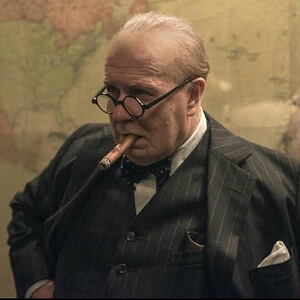 We see a gruff, intimidating, and combative Churchill, who often is “mean” even to his own staff. When he first meets his newly assigned secretary Elizabeth Layton (wonderfully played by Lily James — much more impressive than in her roles as the lead in 2015’s Cinderella or as Debora in Baby Driver), she soon exits Winston’s presence in tears. And when Winston goes to formally introduce himself to King George (an impressive small appearance by Ben Mendelsohn — the evil Orson Krennic of Rogue One), the King admits that Winston “scares him.” Later the King comes to Winston out of respect for his plight and encourages him to be steadfast in Churchill’s almost impossible situation. In addition, the King offers sage advice: “Go to the people of the Kingdom with truth” instead of pretending they were winning the war.
We see a gruff, intimidating, and combative Churchill, who often is “mean” even to his own staff. When he first meets his newly assigned secretary Elizabeth Layton (wonderfully played by Lily James — much more impressive than in her roles as the lead in 2015’s Cinderella or as Debora in Baby Driver), she soon exits Winston’s presence in tears. And when Winston goes to formally introduce himself to King George (an impressive small appearance by Ben Mendelsohn — the evil Orson Krennic of Rogue One), the King admits that Winston “scares him.” Later the King comes to Winston out of respect for his plight and encourages him to be steadfast in Churchill’s almost impossible situation. In addition, the King offers sage advice: “Go to the people of the Kingdom with truth” instead of pretending they were winning the war.
It is so interesting that this film comes out the same year as Dunkirk, as the two films dovetail. But Dunkirk is a film on a grand scope with the small stories of many different people being a part of the entire fabric. Darkest Hour, on the other hand, is the story of one man… a historical giant at a particular time for a particular place and nation. Dunkirk is mentioned in Darkest Hour but only in passing, except for Churchill’s decision on May 26 to launch “Operation Dynamo” where enlisted leisure boats attempted, despite German mines, the Luftwaffe, surface ships, and shoreline shelling, to cross the English Channel to rescue the stranded soldiers. Churchill is seen as decisive in his desire for the evacuation but also stated “Wars are not won by evacuations.”
Incisive Wit/Tender Emotion
I would not want anyone to think the “Darkest Hour” is totally “dark.” Indeed there are moments of great amusement. Churchill is told through his bathroom door that “You need to reply to the Lord Privy Seal.” (The Lord Privy Seal is one of the traditional offices in the British Cabinet.) Winston replies “Please tell the Privy Seal that I’m sealed in the privy and I can only deal with one s*** at a time.” (I laughed out loud.) Likewise for the story of his finding out his “V for Victory” hand sign meant something quite different to the commoners of the Kingdom. There are many other moments of humor, mostly due to Churchill’s quick wit, that I will not spoil for the viewer.
And there are moments of tenderness, especially between Winston and Clemmie (in their private moments he affectionately calls her “Cat” and she addresses him as “Pig”). Their close relationship, despite she and her family’s many sacrifices to his career, appears to be historically well-documented. After he so shamefully badgers Elizabeth Layton, she quietly entreats him to be a better person (“I want people to love and respect you as I do”).
Churchill — ‘An Actor In Love With the Sound of His Own Voice’
Gary Oldman has played many wonderful roles in his life (Sid Vicious in Sid and Nancy, George Smiley in Tinker Tailor Soldier Spy, and many others). I think his role in this film is the ultimate achievement of his career to this point, and not just because of the Kazuhiro Tsujii prosthetics which change him into the “British Bulldog.” His performance portrays Churchill with all his paradoxes… a pillar of strength, vain, warm, ruthless, understanding, a functioning alcoholic… a man who had dealt with failures but a man filled with patriotism, confidence, and pride. His answer to King George when asked if he was “afraid” is an almost whispered, drawn out “Most terribly” spoken as a man going to the gallows. We see that he stoops with, as Clemmie tells him, “the full weight of the world on your shoulders.”
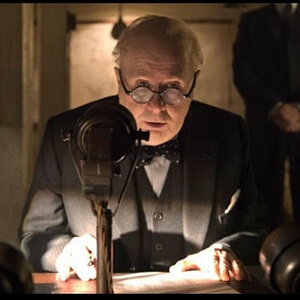 Interesting to me is that Oldman’s portrayal of Churchill is not that much different than John Lithgow’s in Netflix’s The Crown. Of course that was 10+ years later when Winston was more crusty and cynical. If one watches this film, and then the first season of The Crown, one gets an even better perspective on Winston the man. I loved Lithgow’s portrayal too (just like Oldman’s) and his Golden Globe nomination and his Emmy win were well deserved.
Interesting to me is that Oldman’s portrayal of Churchill is not that much different than John Lithgow’s in Netflix’s The Crown. Of course that was 10+ years later when Winston was more crusty and cynical. If one watches this film, and then the first season of The Crown, one gets an even better perspective on Winston the man. I loved Lithgow’s portrayal too (just like Oldman’s) and his Golden Globe nomination and his Emmy win were well deserved.
One can see what a complex man he was, one of most fascinating of the 20th century. Churchill knows his oratory is one of his greatest weapons. Oldman delivers the speeches for which Churchill is famous with understated passion as when he says on May 13 “I would say to the House, as I said to those who have joined this Government: ‘I have nothing to offer but blood, toil, tears and sweat.'” As the war-time journalist Edward R. Murrow (and not a member of the Parliament as attributed in the film) said “He mobilized the English language and sent it into battle.” And Oldman brings all that. His Golden Globe win and Oscar nomination are much earned.
Imaginative Framing
Director Joe Wright is not inexperienced (Atonement, Pride and Prejudice, and the underappreciated The Soloist). He avoids the wooden story-telling that plagues so many historical, biographical films. The film is slavish to its chronology (even resorting to showing each of May’s dates flipped over in desk calendar form). It startles one that so much that was world-altering happened in such a compact period. The sets are often in the underground “war rooms” or the dark parliament, consistent with the title. But working with cinematographer (Academy Award nominated Bruno Delbonnei) he has created numerous innovative but dark screens. A recurring shot is a small square of action in the center of the screen surrounded by darkness (as in a shot through the small window of a black door, or a distant shot of a lighted elevator moving up a completely black screen). Likewise, there are numerous lovely shots of Winston looking out his car’s rear side-window at the British populace on the streets, with a slow pan of the street people from youngsters to business people to the aged. These are beautiful, memorable shots that one takes away from the movie — more than Oldman’s prosthetics (which are flawless). Wright also appears to love aerial shots looking down… whether “falling” through the center of a winding staircase, flying at minimal altitude (with the camera looking straight down) over the pock-marked French countryside, or truly falling with a bomb as it is on its way to destroy the last resistance at Calais.
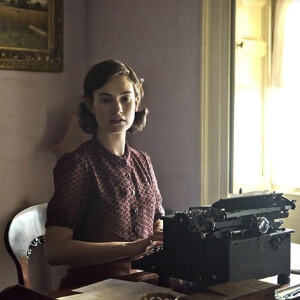 Wright’s decision (along with scriptwriter Anthony McCarten of the lovely The Theory of Everything) to play with the facts is disappointing to me. Many of the scenes in the film, including some critical ones, are fictitious but written “in the spirit” of the actual events. But when one starts to play with facts in that way, viewers come to doubt what they are seeing on the screen. Regardless, there are enough verifiable events to stir one’s soul. Much of the writing is insightful in more modern ways, such as when Elizabeth is shown through the underground war rooms with the admonition “No girls allowed there.”
Wright’s decision (along with scriptwriter Anthony McCarten of the lovely The Theory of Everything) to play with the facts is disappointing to me. Many of the scenes in the film, including some critical ones, are fictitious but written “in the spirit” of the actual events. But when one starts to play with facts in that way, viewers come to doubt what they are seeing on the screen. Regardless, there are enough verifiable events to stir one’s soul. Much of the writing is insightful in more modern ways, such as when Elizabeth is shown through the underground war rooms with the admonition “No girls allowed there.”
What Leader Do We Want? What Leader Would We Get Now?
In this age of loss of faith in our leaders (which pertains to almost all of us regardless of our political leanings), it is interesting to look back on Churchill the man and his imperfections. Would we tolerate such a leader today? Did his stubborn resistance make him the man for that “Darkest Hour” or did Great Britain survive despite his alcohol-fed decisions? How many lives were spared by his decisions… and how many were lost? Early on, Viscount Halifax — who would not take the job himself — said “We may have to replace him.” I suspect now that the public perception of our leaders is largely painted by social and mass media… we cannot turn off our smart phones and the 24-hour news cycle is voracious for every little tidbit of our leader’s private life. I do not think Winston would have survived that.
So if the events of that time and place stimulate you and make you wonder “What if…”; if you love an actor being transformed, not just physically, but behaviorally, into the image of a giant; if you love a director with a firm hand and imaginative cinematography; and if you can bear with a few made-up scenes to portray the “spirit” of that time… this movie is a must-see.

